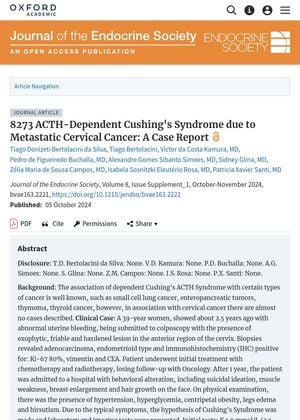ACTH-Dependent Cushing's Syndrome Due to Metastatic Cervical Cancer: A Case Report
October 2024
in “
Journal of the Endocrine Society
”

🚨 The case report is primarily focused on Cushing's syndrome and metastatic cervical cancer, with some relevance to human biology related to hair due to the mention of hirsutism, which involves excessive hair growth.
TLDR Metastatic cervical cancer can cause rare, severe Cushing's syndrome with high risk of death.
This case report describes a rare instance of ACTH-dependent Cushing's syndrome caused by metastatic cervical cancer in a 39-year-old woman. The patient initially presented with symptoms such as abnormal uterine bleeding and was diagnosed with endometrioid adenocarcinoma. After initial treatment and a period of lost follow-up, she developed symptoms indicative of Cushing's syndrome, including hypertension, hyperglycemia, and hirsutism. Laboratory tests confirmed elevated levels of ACTH and cortisol. Imaging revealed metastatic liver lesions and adrenal enlargement. Despite treatment attempts with Etomidate and Ketoconazole, and a subsequent bilateral adrenalectomy, the patient succumbed to septic shock shortly after surgery. This case highlights the diagnostic challenges, treatment complexity, and high morbidity and mortality associated with this rare condition, with fewer than 10 similar cases reported.




